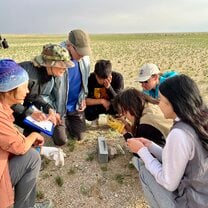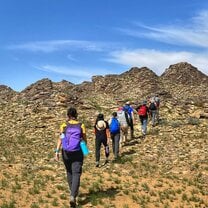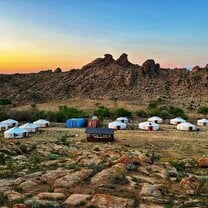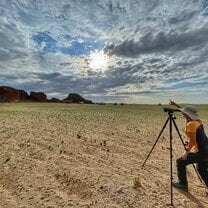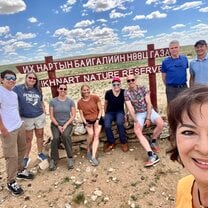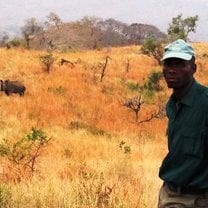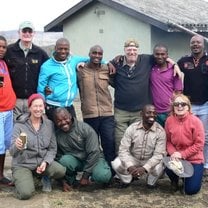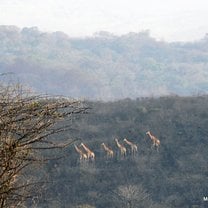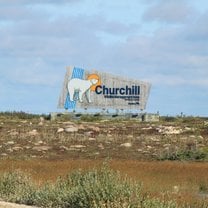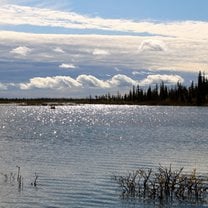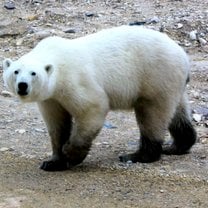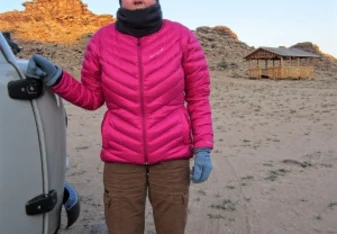Earthwatch’s Wildlife of the Mongolian Steppe was my first expedition with the organization, and I must say, I wish I had known about Earthwatch years ago! After this incredible experience, I am now determined to join many more of their expeditions in the future. I found out my impression was not actually unique. One volunteer in my group has joined Earthwatch 9 times, and another has joined 7 times!
I have always been drawn to adventure and exploring unique corners of the world, as well as connecting with inspiring, like-minded individuals from diverse backgrounds. Earthwatch has provided me with the perfect opportunity to combine my love for travel and adventure with my passion for volunteering and environmental conservation. I was thrilled to learn and actively contribute during the expedition.
The focus of Earthwatch Mongolia is particularly intriguing as they aim to study the impact of climate change on the ecosystems and wildlife of the Mongolian Steppe. Our group, consisting of six volunteers, was fortunate to have Mary-Jo, an expert in cinereous vultures, as one of our group leaders. Another group leader Rentsen Oyunbat (Remo), who is the director of the Mongolian Conservation Initiative and an expert in small mammals, consistently radiated positivity and upbeat energy to organizing activities and life around the camp. In addition to studying the near threatened cinereous vultures, we worked alongside students and researchers who were conducting studies on small mammals, the endangered argali sheep, ibex, lesser kestrel birds, the endangered marmots, insects, and plants.
Thanks to Earthwatch and the camp manager (thank you Uujgii!), the camp exceeded my expectations in terms of comfort, with modern-like amenities like sun showers and sinks in our gers (traditional Mongolian tents). The teamwork and camaraderie among the volunteers, students, and staff were exceptional. We all enjoyed working together in the field (thank you Remo, Jak and Ulmaa for taking us safely to and from the fields!), and having our meetings and meals together in the dining ger. The food was tasty and always prepared fresh (thank you Babu and Oyunaa!). And our gers were cleaned everyday! (thank you Ari!).
The range of activities during the expedition was diverse and exciting. We participated in setting up traps for small mammals and insects, tagging captured mammals, monitoring lesser kestrel and marmots activities, observing vulture nests, and hiking long distances to monitor argali sheep and ibex. We also conducted plant surveys and used the opportunity to strengthen our counting in Mongolian! During the entire 11-day expedition, we had no internet, no mobile signal, and no TV. Surprisingly, I found this lack of connectivity to be incredibly peaceful. We embraced early bedtimes, early mornings, and marveled at the vertical expanse of the Milky Way in the middle of the night. The culture day on day 7 was particularly special with a delightful Mongolian barbecue lunch, followed by a visit to the ruins of an 18th-century monastery and unique rock formations, mini bazaar by locals showcasing their art crafts, and demonstration by one of the students, a skilled competitive archer, who shared his knowledge of this traditional Mongolian sport. For those concerned about communication, I recommend downloading Google Translate for Mongolian, which can be used offline. While not perfect, it proved to be quite helpful.
Mongolia is a country steeped in history, and this expedition allowed me to fully immerse myself in its culture, interact with its people, and learn more about the country's rich heritage. The Mongolian people are warm-hearted and deeply passionate about their country.
In summary, my experience with Earthwatch's Wildlife of the Mongolian Steppe expedition was nothing short of amazing and truly unique. It provided me with the opportunity to explore a beautiful and remote region, contribute to scientific research, and connect with incredible individuals. I am eagerly looking forward to my future endeavors with Earthwatch and the adventures that lie ahead.

